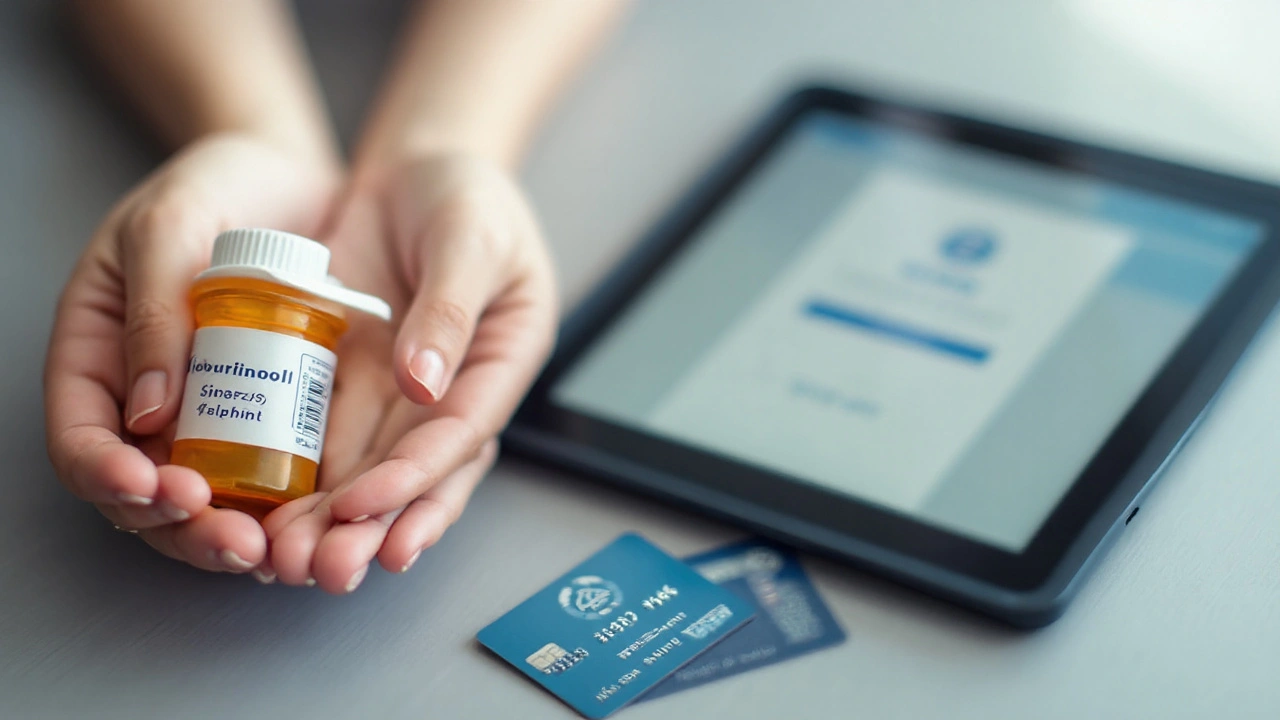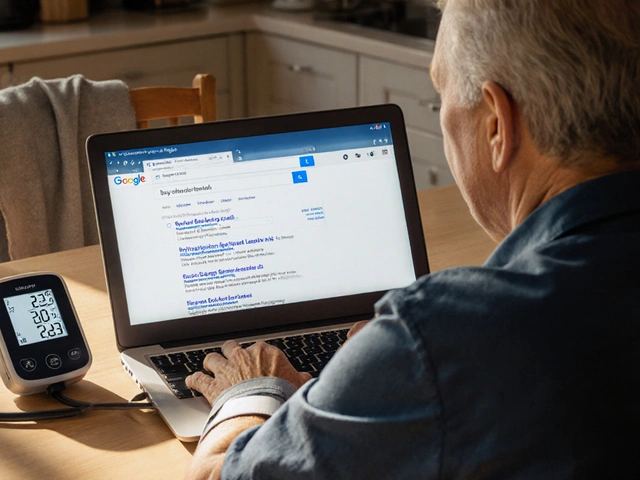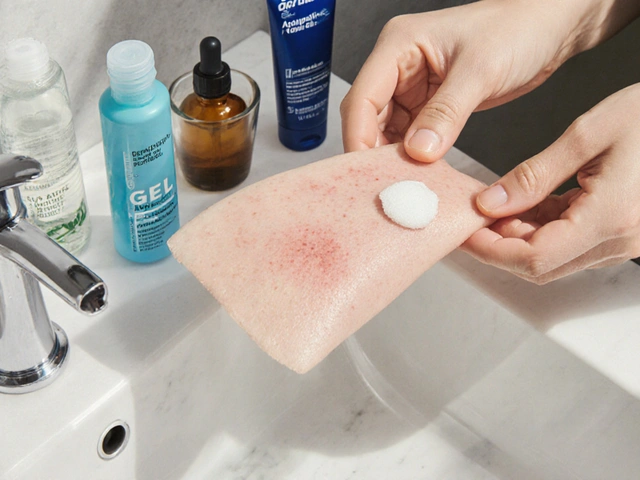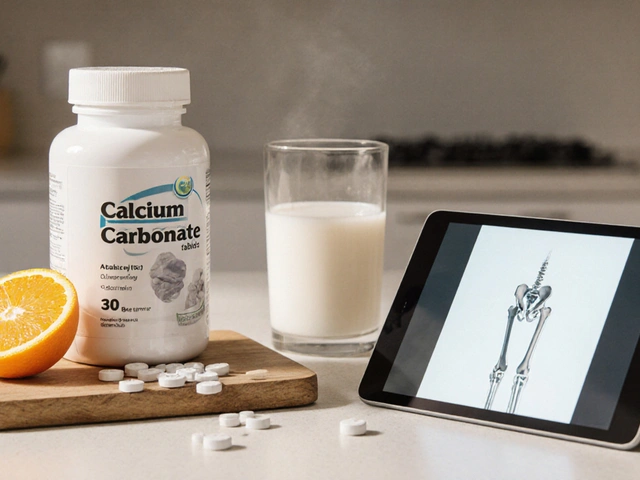Aug
11

- by Gareth Harington
- 10 Comments
If your feet suddenly start aching like someone dropped a bowling ball on your big toe, you might already know about Allopurinol. People battling gout, kidney stones, or high uric acid end up searching for it sooner or later. The internet feels full of promises—you're just a few clicks away, right? But wait, not every pharmacy website is what it seems. Some dress up fancy, flash discounts, and ask for your credit card almost immediately. Dive into buying meds online without a clue, and you might get scammed, sent sugar pills, or just ripped off entirely. Yeah, that's the ugly underbelly of the web you don’t see in TV commercials.
Allopurinol 101: Why People Search for It Online
Gout isn’t just old folks yelling at clouds. Uric acid builds up, forms sharp crystals, and suddenly your joints hurt like hell. Doctors usually recommend the standard stuff—avoid red meat, drink water, blah blah—but when that's not enough, buy allopurinol online starts creeping into Google searches. Allopurinol blocks uric acid production, making flare-ups way less likely. One interesting twist? It’s on the World Health Organization’s List of Essential Medicines, meaning it’s seriously important for public health worldwide. If your doc prescribes it, you kind of need it, not next month, but right now.
Going online seems smart, especially if you want privacy or your local chemist charges double for branded pills. In 2023, a survey from a UK-based patient forum found that 22% of regular Allopurinol users have bought it online at least once, just because it was cheaper or faster. People stuck in rural areas, with limited healthcare access, rely on online pharmacies even more. But no matter who you are, fake meds are a real risk—Interpol's Operation Pangea, which targets illegal online pharmacies, seized over 3 million fake pharmaceuticals in 2024 alone. That includes 'Allopurinol' boxes filled with chalk. Not kidding.
Another reason people chase Allopurinol online? No insurance. In the US, a single 30-day supply can swing between $15 at the local pharmacy to under $5 when ordered online. With prices that varied, why wouldn't you look for a cheaper way out? Couples with a tight family budget do it, and so do retirees. Even my neighbor John, who spends his afternoons walking Max with me, admitted to shopping for his gout meds on his phone while waiting in line at the bank. He’s not unique—an American Journal of Medicine poll pegged the number of older adults trying to duck pharmacy lines and find bargains online at about 16% last year.
The stigma around online meds is fading, especially since COVID-19. More people order prescriptions, refills, and even consult their doctors virtually. Big chains like Walgreens and Boots now offer UK or US-only mail order, but loads of generic Allopurinol also comes from licensed online suppliers in India, Turkey, and Canada. Good online pharmacies will always require a prescription. If one’s trying to ship you prescription meds with no questions asked, run the other way. The legit ones might take a bit longer but will actually save you money—and keep you safe.
Finding a Safe Online Pharmacy: What to Watch Out For
This is where things get tricky. The number one rule? Never buy Allopurinol or any prescription drug from any site that doesn’t require a real prescription. Full stop. Don’t trust sites using words like “miracle cure” or ones that hide their pharmacist’s credentials at the bottom of the page. A solid online pharmacy will make it painfully obvious that you need to upload or fax your prescription before they’ll even quote you a price.
Here’s a quick checklist for zeroing in on safe suppliers:
- Check for certification marks like the National Association of Boards of Pharmacy (NABP) in the US, or its Verified Internet Pharmacy Practice Sites (VIPPS) program. In Europe and the UK, look for the green cross logo and links to government pharmacy registers.
- Make sure the website gives a physical address, a phone number, and licensed pharmacist availability (ask a question—see if they answer!).
- The pharmacy should ask for your doctor’s prescription, not just a quick online quiz.
- Prices that are too good to be true usually are. If a 30-day Allopurinol pack costs 90% less than market price, you’re probably buying fake pills or nothing at all.
- Payment security is no joke. Secure payment (look for HTTPS in the web address), not weird untraceable payment methods, and no pushy emails demanding a sale.
- Check third-party reviews outside their website. Look up their name on Trustpilot or PharmacyChecker, or see if they’re blacklisted on do-not-buy lists.
Want the science behind it? The FDA estimates that up to 97% of rogue pharmacies selling prescription drugs online are actually illegal and unsafe. The European Commission surveyed EU countries and found about 46% of all random Allopurinol packs sold online to unknowing buyers contained the wrong amount of active ingredient. Sometimes, it had none at all.
This doesn’t mean all online Allopurinol is fake. But doing your homework can mean the difference between pain relief and a hospital visit. My honest advice—take screenshots, keep email records, and always track your parcels. If your pills arrive with odd packaging or foreign-language inserts, call the company. Good pharmacies should have nothing to hide, and real Allopurinol from reputable Indian, UK, or Canadian suppliers is usually identical to what you’d buy locally—just check the manufacturer name.
| Country | Average Price (30 tablets) | Prescription Required? | Certified Pharmacies |
|---|---|---|---|
| USA | $12 - $32 | Yes | 500+ |
| UK | £8 - £20 | Yes | 250+ |
| Canada | CA$10 - CA$22 | Yes | 120+ |
| India | $2 - $8 | Yes | 300+ |
Online shopping means global shipping. If your package gets stuck in customs, you may have to show a prescription or pay small fees. So, always keep your paperwork handy.

Placing Your Order: Step-by-Step
No one likes clicking through endless pop-ups and signup forms just to end up empty-handed. Ordering Allopurinol online starts with finding the right pharmacy, but you still need to play by the rules. Here’s how a typical, smooth Allopurinol purchase goes:
- Find a certified online pharmacy using the criteria above. Double-check their name on the NABP or European Medicines Agency website.
- Create an account. Use a secure email, preferably not your main one, and set a strong password—better safe than sorry.
- Upload or email your doctor’s prescription. Some pharmacies let you use an online doctor service—they’ll review your case and fax the script for a small fee.
- Check the dosage and quantity. Allopurinol comes in 100 mg, 200 mg, and 300 mg tablets. Don’t guess—ask your doctor what dose you need. Many folks start at 100 mg, then scale up as their doctor tells them.
- Add to cart and check shipping options. Most reliable sites offer tracked, insured delivery. If you’re outside the US or EU, choose EMS or DHL over regular postal delivery—yes, it costs more, but you’ll likely actually get your package.
- Pay with a secure card or PayPal. If they only offer crypto or wire transfer, walk away. You want the option to dispute the charge if something goes wrong.
- Save all confirmation emails and order numbers. Set a reminder in your phone to check tracking updates. If nothing changes after 5 days, reach out to customer support—good online pharmacies usually respond within 48 hours.
- When your package arrives, inspect the seal, expiry date, brand/manufacturer, and insert. Take photos if anything looks iffy or you need proof later.
Extra tip: some pharmacies offer auto-refill options, which can save a few dollars each month but lock you into automatic shipments. This can be a lifesaver if you’re forgetful or travel for work, but double-check their cancellation policy.
If you're uninsured, take advantage of online coupons or manufacturer rebate programs. Even with those, the price gap between American and non-American sites is huge, and shipping is rarely more than $15 total for an entire month’s supply. But watch out for hidden fees or misleading deals that don’t include tracked shipping.
Medication delivered faster than pizza sounds great, but don’t rush. Triple-check everything at each step. Lots of people skip reading the fine print only to end up scrambling when the meds don’t arrive on time, or they arrive full of weird spelling errors and dodgy instructions. Don't let that be you.
Max’s Legacy: Tips and Real-World Stories
You learn just as much from people’s mistakes as from their wins. My dog Max, who’s usually more concerned with his squeaky toy than my meds, once knocked a new bottle of Allopurinol off my desk, scattering them everywhere. It made me realize how careful you have to be, not just about buying the right pills, but also keeping them safe at home—especially if you’ve got pets or kids. But before those pills ever landed in my mailbox, I’d fumbled through exactly the kind of sketchy online pharmacies you should avoid.
There was the time I ordered from what looked like a legit Canadian pharmacy, only to get a package with ominous Russian labels and mystery pills inside. Naturally, I tossed them and learned to always stick with pharmacies certified by CIPA (Canadian International Pharmacy Association) or PharmacyChecker. Friends have shared their own horror stories: delayed shipments, vanishing tracking numbers, and customer service lines that don’t even pick up. Yet, talk to others who did their research, and they’ll brag about saving 50% or more—especially on long-term supplies, like three or six months at a time.
Here are a few practical tips from people who've gone the distance:
- Set up alerts for when your supply is running low—don’t wait for your last pill before logging in.
- Start small. If you’re new to an online pharmacy, order just one month as a test and double-check the pills before re-ordering.
- Stay loyal to good suppliers. Some offer small loyalty bonuses, silent discounts, or faster re-shipping for return customers.
- Never ignore reminder emails saying your prescription is expiring or needs a doctor’s renewal. Pharmacies have to follow strict rules, and you don’t want to miss a delivery because you forgot to upload a new script.
- Share your experience (good or bad) in online forums. Genuine reviews really help others avoid scams and signal the pharmacies worth trusting.
Ordering Allopurinol online isn’t hard, but you need to be smarter than the scammers. Set notifications, keep record of your transactions, and always keep a backup plan in case shipping gets delayed or your order requires extra paperwork at customs. And if your dog’s like Max? Store your meds somewhere safe—out of paw’s reach.






10 Comments
Susan Rose
I always check certification badges and cross-reference the pharmacy on an official registry before I even think about adding anything to cart.
Buyers should save screenshots of the product page, the checkout total, and the prescription upload confirmation so there is a paper trail in case customs or the seller ghost you.
Also, pick tracked shipping and photograph the package the minute it arrives, including seals and the leaflet, then stash those photos in cloud storage
diego suarez
Verified suppliers and tracked shipments are non negotiable.
Keep records of the prescribing doctor and dates, simple as that.
When a site pushes weird payment methods I bail immediately and look elsewhere.
Manno Colburn
Here’s the thing, i got burned once cuz i was lazy and clicked thru a flashy site that had crazy low prices but no real contact info, so lemme spill the tea about what went wrong for me.
They took my card, sent a tracking number that never updated and the pills that finally showed up looked like they were printed in a home office or something, misspelled lot numbers and all, i chucked them straight into the bin.
I learned to always test the first order only, never bulk buy from a new seller right away, start with a month and verify every aspect.
Also, if the box language is wrong or the leaflet is full of grammar mistakes that’s a red flag straight up.
Shuvam Roy
Buying from licensed Indian manufacturers can be cost effective if done correctly, since many reputable producers supply global markets.
Use platforms that list manufacturing batch information and allow verification against the producer's site, and prefer logistics options that provide customs documentation.
Keep prescription scans and export declarations ready when shipping internationally, this reduces delays at customs and prevents seizure.
Jane Grimm
Strict adherence to regulatory verification is essential when procuring any medicinal product online; complacency is how substandard products circulate.
Retailers that obfuscate their licensed status or employ flimsy security protocols should be excluded immediately.
Records must be maintained systematically: invoice, prescription, shipping manifest and batch information, all archived in a retrievable manner.
Nora Russell
Those suggestions are sensible and overdue for wider adoption.
When data is poorly documented or inconsistent, consumers must assume the worst and act conservatively.
It is irresponsible to shortcut verification for the sake of a discount, and I find it astonishing that some still do so despite abundant warnings.
Eve Perron
Start with the clinical need and work outward from there, never start from the price tag because price alone will steer you toward danger long before you see packaging anomalies.
Allopurinol is straightforward pharmacologically, but supply chain integrity matters a great deal because potency and impurities affect outcomes in ways that are not obvious at first glance.
From a practical standpoint, maintain a documented relationship with your prescriber that includes explicit notes about why that dose was chosen, and ask for that information to be included with any international shipping paperwork when possible.
Track manufacturers by batch number and compare expiration dates, and if a pharmacy cannot provide batch verification or the manufacturer’s site does not list that distributor, treat the transaction as high risk.
For patients who rely on steady dosing, set calendar alerts well ahead of refill dates and keep a buffer supply purchased through a vetted supplier; this helps avoid panic purchases that compromise safety.
Pharmacovigilance is not only a national responsibility but also an individual one, and your reports of suspicious products help authorities build cases against rogue sellers.
Document everything in a single folder, include correspondence, receipts, tracking numbers and photographs, because when you contact a bank or regulatory body, that consolidated evidence vastly increases the chance of remediation.
Opt for payment methods that provide consumer protections, save proof of payment, and if you must consider alternative payment routes, ensure there is a dispute process available.
Shipping insurance is worth the small extra fee when a full month’s medication is at stake and customs can sometimes return products to sender instead of destroying them which provides additional leverage if the product is suspect.
Community reviews are helpful but approach them critically; cross check detailed reports rather than star ratings and prefer accounts that include photos and batch details.
Local pharmacist consultation remains invaluable even when you buy online, and many pharmacists will review foreign packaging and inserts to flag issues before you take anything.
For anyone managing a chronic condition and dealing with polypharmacy, keep a medication log and reconcile brand names and generics so there is no confusion once the foreign batch arrives.
Finally, treat continuity of care as the primary objective, not the transaction; the aim is uninterrupted, safe therapy and all other choices should support that single goal.
When in doubt, delay the purchase rather than rush into a cheap option that could destabilize your regimen.
Long term peace of mind is worth the extra time and effort invested upfront
Josephine Bonaparte
Order only from licensed pharmacies and keep the paperwork; period.
Meghan Cardwell
Clinical pharmacology aside, prioritize suppliers who provide COA details, GMP certification references, and transparent cold chain or storage handling if applicable.
For generics like allopurinol, bioequivalence data and manufacturer dossiers are useful indicators because they demonstrate regulatory acceptance in multiple jurisdictions.
Maintain a dossier of vendor credentials and cross-verify those credentials with independent certifiers and third-party quality assessment resources.
stephen henson
Solid practical tips here, saved to my notes for when I need a refill 👍
Also worth saying that small, consistent precautions beat frantic last-minute scrambles any day 😊
Write a comment